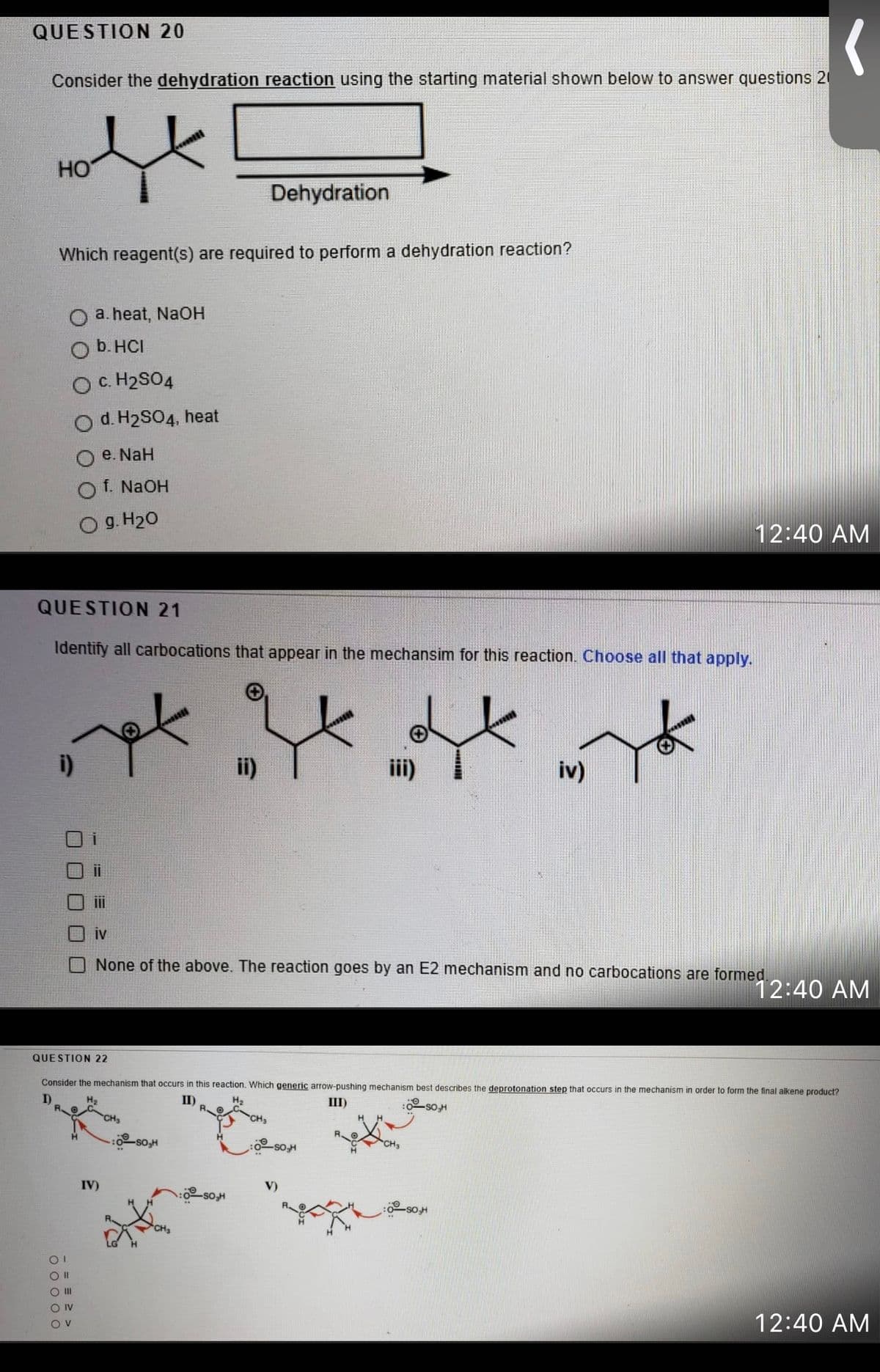Dehydration reactions ALWAY S form the most stable alkene as the major product. What is the major organic product formed during this reaction? iii) iv) O i O iv
Dehydration reactions ALWAY S form the most stable alkene as the major product. What is the major organic product formed during this reaction? iii) iv) O i O iv
Introductory Chemistry: A Foundation
9th Edition
ISBN:9781337399425
Author:Steven S. Zumdahl, Donald J. DeCoste
Publisher:Steven S. Zumdahl, Donald J. DeCoste
Chapter20: Organic Chemistry
Section: Chapter Questions
Problem 125AP
Related questions
Question
Answer question 23 only!!
Questions 20, 21, and 22 are for reference only.

Transcribed Image Text:QUESTION 23
Dehydration reactions ALWAYS form the most stable alkene as the major product. What is the major organic product formed during this reaction?
ii)
iii)
iv)
ii
i
iv

Transcribed Image Text:QUESTION 20
Consider the dehydration reaction using the starting material shown below to answer questions 20
HO
Dehydration
Which reagent(s) are required to perform a dehydration reaction?
a. heat, NaOH
b. HCI
O C. H2SO4
O d. H2SO4, heat
e. NaH
f. NaOH
g. H20
12:40 AM
QUESTION 21
Identify all carbocations that appear in the mechansim for this reaction. Choose all that apply.
i)
ii)
iv)
ii
iv
None of the above. The reaction goes by an E2 mechanism and no carbocations are formed.
12:40 AM
QUESTION 22
Consider the mechanism that occurs in this reaction. Which generic arrow-pushing mechanism best describes the deprotonation step that occurs in the mechanism in order to form the final alkene product?
I)
II)
III)
:0-so,H
so
IV)
V)
O IV
12:40 AM
Ov
口ロ□0ㄩ
Expert Solution
This question has been solved!
Explore an expertly crafted, step-by-step solution for a thorough understanding of key concepts.
This is a popular solution!
Trending now
This is a popular solution!
Step by step
Solved in 2 steps

Knowledge Booster
Learn more about
Need a deep-dive on the concept behind this application? Look no further. Learn more about this topic, chemistry and related others by exploring similar questions and additional content below.Recommended textbooks for you

Introductory Chemistry: A Foundation
Chemistry
ISBN:
9781337399425
Author:
Steven S. Zumdahl, Donald J. DeCoste
Publisher:
Cengage Learning

Chemistry for Today: General, Organic, and Bioche…
Chemistry
ISBN:
9781305960060
Author:
Spencer L. Seager, Michael R. Slabaugh, Maren S. Hansen
Publisher:
Cengage Learning

Introductory Chemistry: A Foundation
Chemistry
ISBN:
9781337399425
Author:
Steven S. Zumdahl, Donald J. DeCoste
Publisher:
Cengage Learning

Chemistry for Today: General, Organic, and Bioche…
Chemistry
ISBN:
9781305960060
Author:
Spencer L. Seager, Michael R. Slabaugh, Maren S. Hansen
Publisher:
Cengage Learning